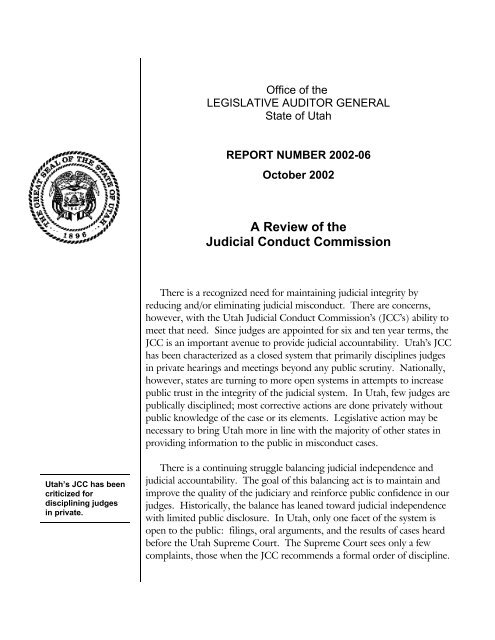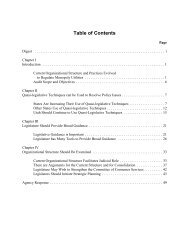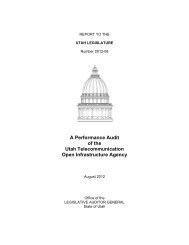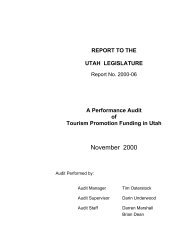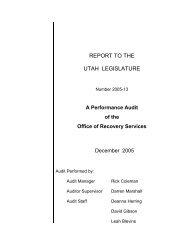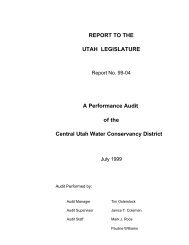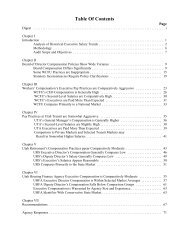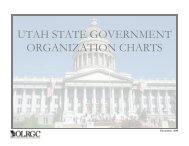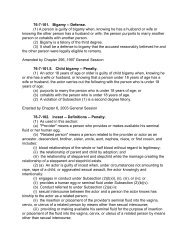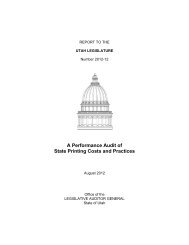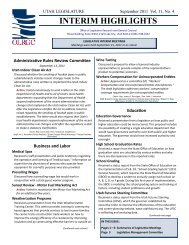A Review of the Judicial Conduct Commission - Utah State Legislature
A Review of the Judicial Conduct Commission - Utah State Legislature
A Review of the Judicial Conduct Commission - Utah State Legislature
Create successful ePaper yourself
Turn your PDF publications into a flip-book with our unique Google optimized e-Paper software.
Office <strong>of</strong> <strong>the</strong>LEGISLATIVE AUDITOR GENERAL<strong>State</strong> <strong>of</strong> <strong>Utah</strong>REPORT NUMBER 2002-06October 2002A <strong>Review</strong> <strong>of</strong> <strong>the</strong><strong>Judicial</strong> <strong>Conduct</strong> <strong>Commission</strong>There is a recognized need for maintaining judicial integrity byreducing and/or eliminating judicial misconduct. There are concerns,however, with <strong>the</strong> <strong>Utah</strong> <strong>Judicial</strong> <strong>Conduct</strong> <strong>Commission</strong>’s (JCC’s) ability tomeet that need. Since judges are appointed for six and ten year terms, <strong>the</strong>JCC is an important avenue to provide judicial accountability. <strong>Utah</strong>’s JCChas been characterized as a closed system that primarily disciplines judgesin private hearings and meetings beyond any public scrutiny. Nationally,however, states are turning to more open systems in attempts to increasepublic trust in <strong>the</strong> integrity <strong>of</strong> <strong>the</strong> judicial system. In <strong>Utah</strong>, few judges arepublically disciplined; most corrective actions are done privately withoutpublic knowledge <strong>of</strong> <strong>the</strong> case or its elements. Legislative action may benecessary to bring <strong>Utah</strong> more in line with <strong>the</strong> majority <strong>of</strong> o<strong>the</strong>r states inproviding information to <strong>the</strong> public in misconduct cases.<strong>Utah</strong>’s JCC has beencriticized fordisciplining judgesin private.There is a continuing struggle balancing judicial independence andjudicial accountability. The goal <strong>of</strong> this balancing act is to maintain andimprove <strong>the</strong> quality <strong>of</strong> <strong>the</strong> judiciary and reinforce public confidence in ourjudges. Historically, <strong>the</strong> balance has leaned toward judicial independencewith limited public disclosure. In <strong>Utah</strong>, only one facet <strong>of</strong> <strong>the</strong> system isopen to <strong>the</strong> public: filings, oral arguments, and <strong>the</strong> results <strong>of</strong> cases heardbefore <strong>the</strong> <strong>Utah</strong> Supreme Court. The Supreme Court sees only a fewcomplaints, those when <strong>the</strong> JCC recommends a formal order <strong>of</strong> discipline.
Legislation limiting Supreme Court review to only JCC-forwardedcases makes <strong>the</strong> JCC a potent control and decision-making body. In <strong>the</strong>past and prior to recent legislation, that control and decision-making waseven more centralized in <strong>the</strong> JCC’s executive director who coulddetermine which complaints went before <strong>the</strong> commission, even before adetermination was made by <strong>the</strong> commission to recommend disciplinaryaction against a judge and send <strong>the</strong> case to <strong>the</strong> Supreme Court. Recentlegislation altered JCC operations by requiring that all complaints gobefore <strong>the</strong> commission, thus alleviating some concerns regarding control.Currently, <strong>the</strong> JCC is an independent, state body constitutionallycharged with investigating complaints filed against <strong>the</strong> 233 judges withinits jurisdiction. Based on its investigation and hearings, <strong>the</strong> JCC mayorder any one <strong>of</strong> a number <strong>of</strong> disciplinary actions. Prior to <strong>the</strong>implementation <strong>of</strong> any JCC order, constitutional power is given to <strong>the</strong>Supreme Court to review and implement, reject or modify <strong>the</strong>commission’s order. The 11-person volunteer JCC has a small staff <strong>of</strong>three people, including an executive director, a part-time investigator andan <strong>of</strong>fice technician. In addition, <strong>the</strong> staff contracts with a part-timeinvestigator.Audit Scope and ObjectivesJCC believes <strong>the</strong>ycannot give auditorsaccess toconfidential fileswithout SupremeCourt authorization.The Audit Subcommittee <strong>of</strong> <strong>the</strong> Legislative Management Committeedirected this <strong>of</strong>fice to conduct a comprehensive audit <strong>of</strong> JCC operationsand practices. The JCC has been unwilling to grant auditors access tocomplaint files because <strong>of</strong> <strong>the</strong>ir interpretation <strong>of</strong> confidentiality provisions.Since <strong>the</strong> commission’s confidentiality provisions have an exception fordisclosure “upon order <strong>of</strong> <strong>the</strong> Supreme Court,” <strong>the</strong> commission has sent aletter to <strong>the</strong> Supreme Court asking for permission to share <strong>the</strong>confidential files with <strong>the</strong> legislative auditor. On October 16, 2002, <strong>the</strong>Supreme Court responded that <strong>the</strong>ir present position is that a blanketdisclosure is unnecessary because <strong>the</strong> JCC could redact specificinformation that would easily identify judges, witnesses and complainantsfrom <strong>the</strong> documents. To redact files would be time consuming anddifficult for JCC’s small staff and would not provide auditors with <strong>the</strong>information necessary to do an independent and comprehensive audit.Fur<strong>the</strong>r, <strong>the</strong> Supreme Court’s response while addressing <strong>the</strong> JCC’s chargedoes not address <strong>the</strong> auditors constitutional right to <strong>the</strong> information sothat <strong>the</strong> auditors can provide an independent review <strong>of</strong> this program. Acomprehensive review <strong>of</strong> complaint files would allow auditors to review– 2 – A <strong>Review</strong> <strong>of</strong> The <strong>Judicial</strong> <strong>Conduct</strong> <strong>Commission</strong>
<strong>the</strong> consistency <strong>of</strong> sanctions, <strong>the</strong> timeliness and efficiency <strong>of</strong> complaintprocessing, and compliance with stated JCC policies and procedures.Without <strong>the</strong> files, <strong>the</strong> audit scope has narrowed to a review <strong>of</strong> <strong>the</strong>organizational structure and confidentiality rules <strong>of</strong> <strong>the</strong> JCC.Need for <strong>Judicial</strong> <strong>Conduct</strong> OversightIs Well EstablishedThe JCCinvestigates,charges, andrecommendsdiscipline <strong>of</strong>accused judges.All states have judicial conduct organizations that investigateallegations <strong>of</strong> potential misconduct and, in cases <strong>of</strong> substantiatedmisconduct, initiate discipline <strong>of</strong> judges. Following <strong>the</strong> national trend,<strong>Utah</strong> created its <strong>Judicial</strong> <strong>Conduct</strong> <strong>Commission</strong>. <strong>Utah</strong>, like most states and<strong>the</strong> federal government, adopted <strong>the</strong> American Bar Association’s ModelCode <strong>of</strong> <strong>Judicial</strong> <strong>Conduct</strong>. Appendix A shows <strong>the</strong> Code <strong>of</strong> <strong>Judicial</strong><strong>Conduct</strong> which was adopted by <strong>the</strong> <strong>Utah</strong> <strong>Judicial</strong> Council as <strong>the</strong> basis fordetermining when misconduct occurs.Given <strong>the</strong> power and independence <strong>of</strong> <strong>the</strong> judiciary, <strong>the</strong> Code <strong>of</strong><strong>Judicial</strong> <strong>Conduct</strong> states that judges must be competent and ethical, and<strong>the</strong>ir actions must foster respect for <strong>the</strong>ir decisions as well as for <strong>the</strong>judiciary as a whole. Judges are expected to conduct <strong>the</strong>mselves accordingto high standards <strong>of</strong> pr<strong>of</strong>essional conduct both in <strong>the</strong> court room as wellas in <strong>the</strong>ir personal lives. The Code <strong>of</strong> <strong>Judicial</strong> <strong>Conduct</strong> attempts to set asystematic method for dealing with ethical problems not covered byexisting laws.The public has highjudicial conductexpectations.The high pr<strong>of</strong>ile and public image <strong>of</strong> <strong>the</strong> judges means that ethicsproblems can damage public confidence in <strong>the</strong> judiciary. Although <strong>the</strong>number <strong>of</strong> allegations and actual cases <strong>of</strong> misconduct are low, how <strong>the</strong>cases are handled is publically scrutinized. Consequently, when <strong>the</strong>re is anallegation <strong>of</strong> misconduct, even if <strong>the</strong> charge is eventually unfounded, <strong>the</strong>reis a cost to judicial credibility that can escalate if <strong>the</strong> public questions <strong>the</strong>review system or how <strong>the</strong> allegation was handled.National Trend Toward OversightThe development <strong>of</strong> judicial conduct commissions or similarorganizations has been a slow and evolving process taken by all 50 statesand <strong>the</strong> federal system. When proposed controls over judicial conductOffice <strong>of</strong> <strong>the</strong> <strong>Utah</strong> Legislative Auditor General – 3 –
<strong>Judicial</strong>independence,combined withjudicial oversight,fosters publicconfidence.began surfacing, <strong>the</strong>re was some concern that such oversight organizationswould pose a threat to judicial independence.There is a long-standing belief that total judicial independence isnecessary so that judges can be free to decide cases without fear <strong>of</strong>retribution or <strong>the</strong> need to curry favor. It has only been in <strong>the</strong> last fortyyears that states have readdressed <strong>the</strong> issue <strong>of</strong> judicial misconduct, turningto a more complete view <strong>of</strong> judicial integrity ra<strong>the</strong>r than just judicialindependence.Those supporting JCCs believe that judicial independence is notimpaired by oversight. Ra<strong>the</strong>r, <strong>the</strong> combination <strong>of</strong> independence andoversight fosters public confidence in <strong>the</strong> courts, essential in a legal systemdependent upon voluntary compliance with judicial decisions. Accordingto supporters <strong>of</strong> JCCs, <strong>the</strong> nature <strong>of</strong> <strong>the</strong> judicial disciplinary systemsestablished across <strong>the</strong> country poses little threat to judicial independencesince <strong>the</strong>y are embedded within existing judicial systems. Most systemsare extensions <strong>of</strong> each state’s judicial branch.<strong>Judicial</strong> <strong>Conduct</strong> Organizations Were Created Because There AreNo Real Alternatives for Oversight. Prior to <strong>the</strong> creation <strong>of</strong> judicialconduct commissions, judicial misconduct in <strong>the</strong> United <strong>State</strong>s was dealtwith through <strong>the</strong> traditional procedures <strong>of</strong> impeachment, removal upon<strong>the</strong> address <strong>of</strong> a majority <strong>of</strong> both houses <strong>of</strong> <strong>the</strong> legislature, or recall. All <strong>of</strong><strong>the</strong>se procedures were considered inadequate for dealing with judicialmisbehavior. The procedures were cumbersome and time-consuming,while <strong>the</strong>ir results were uncertain and entangled in politics. The <strong>Utah</strong>Supreme Court gave a brief review <strong>of</strong> <strong>the</strong> commission’s history andfunction in <strong>the</strong> Wor<strong>the</strong>n decision filed October 22, 1996. The SupremeCourt stated:From 1896 to 1971, <strong>the</strong>re were only two methods for discipliningjudges whose conduct violated ethical norms, removal from <strong>of</strong>ficeand impeachment. “Removal from <strong>of</strong>fice” was authorized underarticle VIII, section 11 <strong>of</strong> <strong>the</strong> <strong>Utah</strong> Constitution (repealed 1984).Removal could be accomplished only by a concurrent vote <strong>of</strong> bothhouses <strong>of</strong> <strong>the</strong> legislature, with two-thirds <strong>of</strong> <strong>the</strong> members <strong>of</strong> eachhouse concurring in <strong>the</strong> removal. <strong>Utah</strong> Const. art. VIII, section11. The article provides that removal should be “for cause” butdoes not specify any particular causes. In contrast, article VI,section 19 provided (as it does today) for impeachment <strong>of</strong> judicial– 4 – A <strong>Review</strong> <strong>of</strong> The <strong>Judicial</strong> <strong>Conduct</strong> <strong>Commission</strong>
<strong>of</strong>ficers for high crimes, misdemeanors, or malfeasance in <strong>of</strong>fice.Impeachment could be initiated only by a vote <strong>of</strong> two-thirds <strong>of</strong> <strong>the</strong>members <strong>of</strong> <strong>the</strong> house <strong>of</strong> representatives, and trial was had to <strong>the</strong>senate, with conviction only upon <strong>the</strong> vote <strong>of</strong> two-thirds <strong>of</strong> <strong>the</strong>senators. <strong>Utah</strong> Const. art. VI, sections 17, 18. The only penaltywhich could be imposed was removal from <strong>of</strong>fice, section 19.The <strong>Utah</strong> Supreme Court concluded that nei<strong>the</strong>r <strong>of</strong> <strong>the</strong>se processeswas effective by fur<strong>the</strong>r stating:Both processes were too cumbersome, and removal from <strong>of</strong>ficewas too draconian a penalty for ei<strong>the</strong>r to be an effective means <strong>of</strong>dealing with allegations <strong>of</strong> judicial misconduct, as is demonstratedby <strong>the</strong> fact that no impeachment or removal from <strong>of</strong>ficeproceedings were held in <strong>the</strong> eighty years that <strong>the</strong>se remained <strong>the</strong>exclusive remedies under <strong>the</strong> constitution.<strong>Utah</strong>, like moststates, has adopted<strong>the</strong> American BarAssociation’s Code<strong>of</strong> <strong>Judicial</strong> <strong>Conduct</strong>.Most <strong>State</strong>s Have Adopted <strong>the</strong> ABA Code <strong>of</strong> <strong>Judicial</strong> <strong>Conduct</strong>.The American Bar Association (ABA) formulated <strong>the</strong> original Canons <strong>of</strong><strong>Judicial</strong> Ethics and adopted <strong>the</strong>m in 1924. Those canons, occasionallyamended, were adopted by most states. In 1972, <strong>the</strong> ABA promulgatedits Model Code <strong>of</strong> <strong>Judicial</strong> <strong>Conduct</strong>. In 1990, <strong>the</strong> ABA issued a revision<strong>of</strong> <strong>the</strong> canons after <strong>the</strong>y determined that current needs and problemsdictated needed revisions.All states except Montana have adopted <strong>the</strong> Code <strong>of</strong> <strong>Judicial</strong> <strong>Conduct</strong>.The Model Code consists <strong>of</strong> broad canons, as well as more specificmeasures, both <strong>of</strong> which are meant to be applied as “rules <strong>of</strong> reason,”consistent with constitutional mandates, statutes, court rules, anddecisional law.In 1960, California was <strong>the</strong> first state to create a permanent statecommission charged with regulating judicial conduct. Additionally, <strong>the</strong>federal government has created a similar system to discipline federaljudges.In addition to <strong>the</strong> code <strong>of</strong> conduct, model rules for enforcement wereestablished by <strong>the</strong> American Bar Association. <strong>Utah</strong>’s JCC has followed<strong>the</strong> lead <strong>of</strong> o<strong>the</strong>r states and patterned its enforcement work after <strong>the</strong>Model Rules for <strong>Judicial</strong> Disciplinary Enforcement. The stated goals for<strong>the</strong> Model Rules include:Office <strong>of</strong> <strong>the</strong> <strong>Utah</strong> Legislative Auditor General – 5 –
1. Conformity with <strong>the</strong> new ABA Model Code <strong>of</strong> <strong>Judicial</strong> <strong>Conduct</strong>.2. Prompt and fair discipline for judges.3. Public confidence in <strong>the</strong> judiciary and in <strong>the</strong> judicial disciplinarysystem.4. Protection <strong>of</strong> <strong>the</strong> public and <strong>the</strong> judiciary.5. Independence <strong>of</strong> <strong>the</strong> judiciary.6. Establish a model for states to use as a resource to establishimproved judicial discipline systems.The Federal <strong>Judicial</strong> <strong>Conduct</strong> System Is Similar to <strong>State</strong> LevelSystems. The federal judicial conduct system differs from state systems inthat federal judges can only be removed from <strong>of</strong>fice through impeachmentby <strong>the</strong> House <strong>of</strong> Representatives and conviction by <strong>the</strong> U.S. Senate.<strong>Conduct</strong> violations and <strong>the</strong> mechanics <strong>of</strong> <strong>the</strong> federal system are, however,quite similar to state judicial conduct organizations. Sanctions forviolation <strong>of</strong> <strong>the</strong> canons, as with states, can include private or publicreprimand, private or public censure, stripping a judge <strong>of</strong> caseassignments, certifying disability, or requesting voluntary retirement.The federal judicialconduct system issimilar to statesystems.Complaints against federal judges are filed with <strong>the</strong> chief judge <strong>of</strong> <strong>the</strong>court <strong>of</strong> appeals in <strong>the</strong> circuit in which <strong>the</strong> alleged misconduct occurred.After reviewing <strong>the</strong> complaint, <strong>the</strong> chief judge ei<strong>the</strong>r dismisses <strong>the</strong>complaint, concludes <strong>the</strong> proceeding if corrective action has been taken, orappoints a special committee.As with most state findings, most complaints are dismissed because<strong>the</strong> complaint is directly related to an appealable decision. If a complaintis not dismissed, a special committee is appointed to investigate <strong>the</strong> factsalleged in <strong>the</strong> complaint and file a written report with findings and arecommendation with <strong>the</strong> circuit judicial council. The council mayconduct any additional investigation it considers necessary. The judicialcouncil may dismiss <strong>the</strong> complaint or can take any one <strong>of</strong> a number <strong>of</strong>codified actions such as request that a judge voluntarily retire, becensured, or be reprimanded.As stated in 28 U.S.C. Section 372(7)(B)(ii), “<strong>the</strong> judicial councilshall promptly certify such determination [disposition], toge<strong>the</strong>r with anycomplaint and a record <strong>of</strong> any associated proceedings, to <strong>the</strong> <strong>Judicial</strong>Conference <strong>of</strong> <strong>the</strong> United <strong>State</strong>s.” The complainant and <strong>the</strong> subject <strong>of</strong> acomplaint can petition <strong>the</strong> United <strong>State</strong>s <strong>Judicial</strong> Conference for review <strong>of</strong>any action taken by a circuit judicial council.– 6 – A <strong>Review</strong> <strong>of</strong> The <strong>Judicial</strong> <strong>Conduct</strong> <strong>Commission</strong>
The <strong>Judicial</strong> Conference can refer a complaint to <strong>the</strong> House <strong>of</strong>Representatives for consideration <strong>of</strong> impeachment.<strong>Utah</strong> Follows National TrendIn 1971, <strong>Utah</strong> followed <strong>the</strong> national trend by creating an entity toreview complaints against judges. Section 38, 1971 <strong>Utah</strong> Laws 113,established a commission concerning judicial qualifications. Between1971 and 1983, <strong>the</strong> statute creating <strong>the</strong> commission had several minoradjustments. In 1984, <strong>the</strong> Constitutional Revision <strong>Commission</strong> renamed<strong>the</strong> entity to <strong>the</strong> <strong>Judicial</strong> <strong>Conduct</strong> <strong>Commission</strong> as part <strong>of</strong> <strong>the</strong> revision <strong>of</strong><strong>the</strong> <strong>Judicial</strong> Article <strong>of</strong> <strong>the</strong> <strong>Utah</strong> Constitution. The provision wasapproved by <strong>the</strong> voters in November <strong>of</strong> 1984 and became effective on July1, 1985.<strong>Utah</strong>’s JCC has beenin existence for over30 years and allowsfor judicial disciplineat a level appropriatefor <strong>the</strong> violation.The aim <strong>of</strong> <strong>the</strong> provision was to provide a specialized and flexiblemeans for investigating alleged misconduct and, ultimately, discipliningjudges at a level appropriate for <strong>the</strong> violation. This provision replaced <strong>the</strong>prior system that could only discipline judges with <strong>the</strong> threat <strong>of</strong>legislatively initiated impeachment or removal from <strong>of</strong>fice. The provisionbecame Article VIII, Section 13 <strong>of</strong> <strong>the</strong> <strong>Utah</strong> Constitution whichestablished <strong>the</strong> <strong>Judicial</strong> <strong>Conduct</strong> <strong>Commission</strong>. Figure 1 details <strong>the</strong>creation and authority <strong>of</strong> <strong>the</strong> JCC in <strong>the</strong> <strong>Utah</strong> Constitution.Office <strong>of</strong> <strong>the</strong> <strong>Utah</strong> Legislative Auditor General – 7 –
Figure 1. Article VIII, Section 13 <strong>of</strong> <strong>the</strong> <strong>Utah</strong> ConstitutionA <strong>Judicial</strong> <strong>Conduct</strong> <strong>Commission</strong> is established which shall investigate andconduct confidential hearings regarding complaints against any justice orjudge. Following its investigations and hearings, <strong>the</strong> <strong>Judicial</strong> <strong>Conduct</strong><strong>Commission</strong> may order <strong>the</strong> reprimand, censure, suspension, removal, orinvoluntary retirement <strong>of</strong> any justice or judge for <strong>the</strong> following:<strong>Utah</strong>’s constitutiongrants <strong>the</strong> JCCbroad authority.(1) action which constitutes willful misconduct in <strong>of</strong>fice;(2) final conviction <strong>of</strong> a crime punishable as a felony under state orfederal law;(3) willful and persistent failure to perform judicial duties;(4) disability that seriously interferes with <strong>the</strong> performance <strong>of</strong>judicial duties; or(5) conduct prejudicial to <strong>the</strong> administration <strong>of</strong> justice which bringsa judicial <strong>of</strong>fice into disrepute.Prior to <strong>the</strong> implementation <strong>of</strong> any commission order, <strong>the</strong> Supreme Courtshall review <strong>the</strong> commission’s proceedings as to both law and fact. Thecourt may also permit <strong>the</strong> introduction <strong>of</strong> additional evidence. After itsreview, <strong>the</strong> Supreme Court shall, as it finds just and proper, issue its orderimplementing, rejecting, or modifying <strong>the</strong> commission’s order. The<strong>Legislature</strong> by statute shall provide for <strong>the</strong> composition and procedures <strong>of</strong><strong>the</strong> <strong>Judicial</strong> <strong>Conduct</strong> <strong>Commission</strong>.While <strong>the</strong> constitution gives broad authority to <strong>the</strong> JCC, it took manyyears to create workable statutes, case law and operating procedures.Limited past Use and MisunderstandingsHave Raised Concerns<strong>Utah</strong>’s JCC had limited funding and limited use for many years. Inrecent years several landmark Supreme Court decisions have begun toclarify <strong>the</strong> JCC’s organizational structure and operating procedures. <strong>Utah</strong>,like most states, has a one-tier discipline system that charges one bodywith overseeing investigations and ruling on <strong>the</strong> findings <strong>of</strong> investigations.Concerns have been raised that this system violates <strong>the</strong> due-process rights<strong>of</strong> judges.Historically JCC Used and Funded Little<strong>Utah</strong>’s JCC has been in existence since 1971 but was not particularlyvisible due to minimal appropriations, no permanent <strong>of</strong>fice, and no fulltimedirector. We were unable to find records showing <strong>the</strong> number <strong>of</strong>– 8 – A <strong>Review</strong> <strong>of</strong> The <strong>Judicial</strong> <strong>Conduct</strong> <strong>Commission</strong>
complaints filed against judges prior to 1995. Since 1995, <strong>the</strong> number <strong>of</strong>complaints has been compiled but has fluctuated.Budget Remained Low for a Number <strong>of</strong> Years. <strong>Utah</strong>’s JCC had aminimal budget from its creation in 1971 until 1995. The minimalfunding meant limited investigations and no trial budget. However, in1996, <strong>the</strong> appropriation was increased from a mere $32,000 to $109,000and had ano<strong>the</strong>r large increase in fiscal year 1997. Figure 2 shows <strong>the</strong>funding history <strong>of</strong> <strong>the</strong> JCC.Figure 2. JCC’s Appropriation History. Budget increases capable<strong>of</strong> changing organizational behavior have only occurred in <strong>the</strong> lasteight years.Fiscal Year Appropriation Change1971 to 1994 $4,000 to $32,0001995 32,000 0%1996 109,000 2411997 207,000 901998 187,600 -91999 218,900 172000 225,600 32001 224,800 -0.32002 238,500 62003 228,200 -4Figure 2 shows that <strong>the</strong> JCC’s budget has increased substantially. Itappears <strong>the</strong> budget was originally used for operating expenses for <strong>the</strong> <strong>the</strong>nfive-person commission. In fiscal year 1996, <strong>the</strong> <strong>Legislature</strong> substantiallyincreased <strong>the</strong> appropriated amount that allowed <strong>the</strong> <strong>of</strong>fice to hire its firstexecutive director in September, 1995. The following year, ano<strong>the</strong>rsubstantial increase in <strong>the</strong> budget allowed <strong>the</strong> <strong>of</strong>fice to hire aninvestigator, pay for <strong>of</strong>fice space, and fund o<strong>the</strong>r <strong>of</strong>fice expenses.Office <strong>of</strong> <strong>the</strong> <strong>Utah</strong> Legislative Auditor General – 9 –
Since 1998, <strong>the</strong> budget has fluctuated between $187,600 and$238,500 allowing <strong>the</strong> <strong>of</strong>fice to have a permanent location, an executivedirector, and a small staff. In a review <strong>of</strong> <strong>the</strong> American Judicature Society’sSurvey <strong>of</strong> <strong>Judicial</strong> <strong>Conduct</strong> Organizations’ Complaint Dispositionsreported in <strong>the</strong> <strong>Judicial</strong> <strong>Conduct</strong> Reporter, Fall 2000, <strong>Utah</strong>’s currentfunding level is comparable with o<strong>the</strong>r states. <strong>Utah</strong>’s JCC budget percapita is $.10. O<strong>the</strong>r states range from $.01 to $.40. <strong>Utah</strong>’s JCC budgetper judge is $930. O<strong>the</strong>r states’ budget per judge ratio ranges from aslow as $80 per judge to more than $3,500 per judge.Most Complaints Against Judges Are Dismissed. While <strong>the</strong>funding for <strong>the</strong> JCC has increased, <strong>the</strong> number <strong>of</strong> complaints filed againstjudges has not. Most complaints against judges are dismissed because<strong>the</strong>y involve matters that can be appealed to a higher court. The highdismissal rate creates a misconception for some that <strong>the</strong>re are problemswith <strong>the</strong> system. The high level <strong>of</strong> confidentiality within <strong>the</strong> system thathas allowed some discipline to be handled privately between <strong>the</strong> accusedjudge and <strong>the</strong> JCC also adds to this misconception <strong>of</strong> problems. Thepublic has only been given information in those few cases that went to <strong>the</strong>Supreme Court.Figure 3. Complaints and Dispositions Per Fiscal Year. Whilemost complaints against judges continue to be dismissed, <strong>the</strong>greatest change has been in <strong>the</strong> level <strong>of</strong> review and kind <strong>of</strong>sanctions issued.Fiscal YearComplaintsReceivedComplaintsDismissedPrivateSanctionsPublicSanctions1996 84 68 8 01997 72 71 5 0Since 1996, 84% <strong>of</strong>all complaints havebeen dismissed.1998 95 65 1 41999 125 130† 9 52000 97 76 3 22001 115 87 3 32002 94 77 5 0TOTAL 682 574 34 14Source: Unaudited data from JCC’s annual reports.† Complaints dismissed and sanctions may be from complaints received in a prior year.– 10 – A <strong>Review</strong> <strong>of</strong> The <strong>Judicial</strong> <strong>Conduct</strong> <strong>Commission</strong>
Figure 3 shows that since 1996, <strong>the</strong>re have been 682 complaints filedagainst judges. Fourteen were public sanctions, all but three <strong>of</strong> whichhave been stipulated. Stipulated dispositions are punishments agreedupon by <strong>the</strong> <strong>Judicial</strong> <strong>Conduct</strong> <strong>Commission</strong> and <strong>the</strong> charged judge, andtypically <strong>the</strong>se agreements do not allow for <strong>the</strong> release <strong>of</strong> confidentialinformation. The Supreme Court must concur with <strong>the</strong> stipulatedagreement or else <strong>the</strong> judge may withdraw any admittance <strong>of</strong> guilt. Threeformal hearings and three Supreme Court decisions have been issued.In 1995, 115 complaints were received, but we were unable to find<strong>the</strong> disposition <strong>of</strong> those complaints. We were unable to find complaintdata fur<strong>the</strong>r back than 1995, but since 1996, <strong>the</strong> annual number <strong>of</strong>complaints has been between 72 and 125. In a review <strong>of</strong> <strong>the</strong> AmericanJudicature Society’s Survey <strong>of</strong> <strong>Judicial</strong> <strong>Conduct</strong> Organizations’ ComplaintDispositions reported in <strong>the</strong> <strong>Judicial</strong> <strong>Conduct</strong> Reporter, Summer 2000,<strong>Utah</strong>’s number <strong>of</strong> complaints received per judge and complaints per capitawere comparable to o<strong>the</strong>r states. In <strong>Utah</strong> <strong>the</strong>re were .54 complaints perjudge compared to .06 to 1.50 complaints per judge in o<strong>the</strong>r states.Similarly, <strong>the</strong> complaints per capita were comparable with one complaintfor every 17,865 citizens in <strong>the</strong> state. O<strong>the</strong>r states ranged from onecomplaint for every 6,636 citizens to one complaint for every 150,607citizens.The majority <strong>of</strong> complaints filed with <strong>the</strong> JCC have been dismissed bystaff action. The JCC’s Executive Director drew <strong>the</strong> conclusion prior to<strong>the</strong> 2000 Legislative Session that much <strong>of</strong> <strong>the</strong> criticism leveled against <strong>the</strong>JCC was due to <strong>the</strong> high level <strong>of</strong> authority exercised by JCC staff. As aresult <strong>of</strong> H.B. 285, every complaint filed with <strong>the</strong> JCC must bethoroughly reviewed and analyzed by staff as well as <strong>the</strong> 11commissioners.This high level <strong>of</strong> dismissals, while disconcerting to some, is notuncommon. <strong>Utah</strong>, like o<strong>the</strong>r states, dismisses complaints for a variety <strong>of</strong>reasons. Reasons for dismissal include <strong>the</strong> following:Most complaints aredismissed because<strong>the</strong>y involve anappealable matter.• No misconduct – Sometimes a JCC receives complaints that areclearly frivolous or have no basis.• No jurisdiction – Sometimes a JCC receives complaints againstpeople who are not judges.• Appellate matter – Sometimes a JCC receives complaints thatinvolve appellate matters. i.e., matters appropriate for review byOffice <strong>of</strong> <strong>the</strong> <strong>Utah</strong> Legislative Auditor General – 11 –
an appellate body with <strong>the</strong> power to correct an erroneous judicialruling. A JCC has no authority to change <strong>the</strong> ruling <strong>of</strong> a court,even if that ruling is incorrect.• Lack <strong>of</strong> pro<strong>of</strong> – Sometimes it is not possible to obtain pro<strong>of</strong> thatwould support a sanction or removal, even if <strong>the</strong> allegations wereserious.<strong>Utah</strong> is not unique in <strong>the</strong> high number <strong>of</strong> dismissed complaints. In<strong>the</strong> latest survey compiled by <strong>the</strong> American Judicature Society, <strong>the</strong> averagenational dismissal rate was 89 percent. Figure 4 shows how <strong>Utah</strong>compares to <strong>the</strong> national average and western states on dismissal andcarryover complaints.Figure 4. Western <strong>State</strong> Dismissal Rate Comparison. <strong>Utah</strong>’sdismissal and carryover rates compared with o<strong>the</strong>r western stateswith one-tier systems.<strong>State</strong>AverageDismissal RateAverageCarryover RateCalifornia 94% 10%Colorado 99 0Idaho 95 5Nevada 96 22Oregon 98 5<strong>Utah</strong> dismissesfewer complaintsand carries forwardmore cases than <strong>the</strong>national average.Washington 92 30Western <strong>State</strong> Average 96 12<strong>Utah</strong> 82 22National Average 89 15Source: American Judicature Society Survey Results reported in <strong>the</strong> <strong>Judicial</strong> <strong>Conduct</strong> Reporter,Winter 1999.Figure 4 shows that <strong>Utah</strong> dismissed 82 percent <strong>of</strong> all complaintsreceived while nationally 89 percent <strong>of</strong> all complaints were dismissed,and 96 percent <strong>of</strong> all complaints in select western states were dismissed.One <strong>of</strong> <strong>the</strong> reasons <strong>Utah</strong>’s dismissal rate may be lower is that <strong>Utah</strong> carries– 12 – A <strong>Review</strong> <strong>of</strong> The <strong>Judicial</strong> <strong>Conduct</strong> <strong>Commission</strong>
forward more complaints than is done by o<strong>the</strong>r western states andnationally. Carry-forward complaints are those complaints that are notcompleted in <strong>the</strong> year <strong>the</strong>y are received and are carried forward to <strong>the</strong>following year.<strong>Utah</strong> carries forward 22 percent <strong>of</strong> its cases while <strong>the</strong> six western statesonly carried forward 12 percent <strong>of</strong> <strong>the</strong>ir complaints. <strong>Utah</strong> has one <strong>of</strong> <strong>the</strong>highest case carry-forward rates in <strong>the</strong> nation. Of <strong>the</strong> six western statesexamined, only Washington and Nevada had carry-forward rates above 10percent. California, Colorado, Idaho, and Oregon had carry-forward rates10 percent or lower for <strong>the</strong> same time period.Criteria for Dispositions May Not Be Well Defined. When acomplaint results in a disposition, disciplinary action is recommended by<strong>the</strong> JCC. It is unclear how <strong>the</strong> JCC chooses which action to take against ajudge because <strong>the</strong>re is no specified formula or grid for arriving at adisciplinary action. There are five available dispositions listed in statuteand in <strong>the</strong> <strong>Utah</strong> Constitution, in what appears to be an increasing order<strong>of</strong> severity. The dispositions, with a brief description from Black’s LawDictionary, are• reprimand - a public or formal censure or severe repro<strong>of</strong>• censure - a formal resolution reprimanding a judge• suspension - <strong>the</strong> temporary forced removal without pay• removal from judicial <strong>of</strong>fice - a dismissal from <strong>of</strong>fice• involuntary retirement - forced retirementIt is unclear what <strong>the</strong> difference is between a reprimand and a censure.Even Black’s Law Dictionary appears to use <strong>the</strong> words interchangeably.Some discipline is handled privately while o<strong>the</strong>rs are handled publicly.According to <strong>the</strong> past Executive Director <strong>of</strong> <strong>the</strong> JCC, “private” sanctionswere set up so that a judge could admit his/her guilt and makecorrections, especially if this was a first time problem and <strong>the</strong> judge didnot know he/she had violated <strong>the</strong> code <strong>of</strong> judicial conduct.Some reprimands and censures can be stipulated where <strong>the</strong>punishment is agreed upon by <strong>the</strong> JCC and <strong>the</strong> judge. These agreementsmay allow for <strong>the</strong> release <strong>of</strong> confidential information. O<strong>the</strong>rwise, <strong>the</strong>stipulated disposition will be <strong>the</strong> only item available to <strong>the</strong> public.Office <strong>of</strong> <strong>the</strong> <strong>Utah</strong> Legislative Auditor General – 13 –
Frequently, Judges seek to avoid hearings by submitting to stipulatedagreements.Public dispositions, unlike private dispositions, release someconfidential information to <strong>the</strong> public. Public dispositions must beincluded in <strong>the</strong> <strong>Utah</strong> Voter Information Pamphlet when a judge isconsidered for retention election. Judges that receive a public dispositionmust appear before <strong>the</strong> <strong>Judicial</strong> Council and show cause why <strong>the</strong>y shouldnever<strong>the</strong>less be certified as a judge qualified for retention election. If <strong>the</strong>council does not recertify <strong>the</strong> sitting judge, <strong>the</strong> judge cannot run forretention election.As part <strong>of</strong> <strong>the</strong> certification process, judges must receive at least 70percent positive feedback from <strong>the</strong> <strong>Utah</strong> <strong>Judicial</strong> Council Survey <strong>of</strong><strong>Judicial</strong> Performance to qualify for retention election. The survey isdivided into two parts: Part I–Certification information; and, PartII–<strong>Judicial</strong> Self-Improvement. A sample <strong>of</strong> attorneys who have appearedbefore each judge anonymously respond to <strong>the</strong> survey which provides PartI information to be used by <strong>the</strong> <strong>Judicial</strong> Council “as an aid in its decisionto certify a judge for retention election.” The Part II self-improvementinformation is sent directly to <strong>the</strong> judge to assist <strong>the</strong> judge in his or hercourtroom performance. See Appendix B for a copy <strong>of</strong> <strong>the</strong> <strong>Utah</strong> <strong>Judicial</strong>Council Survey <strong>of</strong> <strong>Judicial</strong> Performance instrument for both <strong>the</strong> TrialCourts and <strong>the</strong> Appellate Court.JCC Operations Have Evolved with Court DecisionsThe JCC operated with few guidelines from 1971 to 1995, but since1996, <strong>the</strong> JCC has received direction from Supreme Court decisions andfrom legislative mandates. The first major changes occurred in <strong>the</strong>Wor<strong>the</strong>n decision. In this decision, <strong>the</strong> justices gave very specificoperating instructions to <strong>the</strong> JCC. The JCC’s executive director draftedrules to comply with statutes and <strong>the</strong> Supreme Court decision. It tookseveral appearances before <strong>the</strong> Administrative Rules Committee before <strong>the</strong>JCC’s rules were brought into compliance.The landmarkWor<strong>the</strong>n decisionand o<strong>the</strong>r SupremeCourt decisionshave provideddirection to <strong>the</strong> JCC.Shortly after <strong>the</strong> Wor<strong>the</strong>n decision, <strong>the</strong> Supreme Court providedadditional instructions and direction for <strong>the</strong> <strong>Judicial</strong> <strong>Conduct</strong><strong>Commission</strong>. The court emphasized <strong>the</strong> requirement that <strong>the</strong>“<strong>Commission</strong> should specifically link its findings with <strong>the</strong> individualcanons <strong>of</strong> <strong>the</strong> Code <strong>of</strong> <strong>Judicial</strong> <strong>Conduct</strong> as required by our decision in– 14 – A <strong>Review</strong> <strong>of</strong> The <strong>Judicial</strong> <strong>Conduct</strong> <strong>Commission</strong>
Wor<strong>the</strong>n.” The court fur<strong>the</strong>r requested <strong>the</strong> “<strong>Commission</strong> be morespecific in referencing its own guidelines and explaining <strong>the</strong> reasoning itemployed in reaching its recommendation as to sanction,...”• The Young III case reminded <strong>the</strong> <strong>Judicial</strong> <strong>Conduct</strong> <strong>Commission</strong> <strong>of</strong><strong>the</strong> court’s finding in <strong>the</strong> McCully case that “we [<strong>the</strong> <strong>Utah</strong>Supreme Court] will not overturn <strong>the</strong> <strong>Commission</strong>’s findings <strong>of</strong>fact unless <strong>the</strong>y are arbitrary, capricious, or plainly in error, but wereserve <strong>the</strong> right to draw inferences from <strong>the</strong> basic facts which maydiffer from <strong>the</strong> <strong>Commission</strong>’s inferences and grant no deference to<strong>the</strong> <strong>Commission</strong>’s ultimate decision as to what constitutes anappropriate sanction.” The Wor<strong>the</strong>n, McCully, and Young caseshelped establish some <strong>Judicial</strong> <strong>Conduct</strong> <strong>Commission</strong> guidelines;however, <strong>the</strong> <strong>Legislature</strong> has provided for most <strong>of</strong> <strong>the</strong> commissionprocedures and rules.The <strong>Legislature</strong> isresponsible for <strong>the</strong>composition andprocedures <strong>of</strong> <strong>the</strong>JCC.Article VIII, Section 13 <strong>of</strong> <strong>the</strong> <strong>Utah</strong> Constitution gives <strong>the</strong> <strong>Legislature</strong><strong>the</strong> authority “to provide for <strong>the</strong> composition and procedures <strong>of</strong> <strong>the</strong><strong>Judicial</strong> <strong>Conduct</strong> <strong>Commission</strong>.” Recently, <strong>the</strong> <strong>Legislature</strong> passed HouseBill 285 during <strong>the</strong> 2000 General Session and House Bill 136 during <strong>the</strong>2002 General Session clarifying commission procedures and duties.Proponents <strong>of</strong> <strong>the</strong> bills claim that changes in <strong>Judicial</strong> <strong>Conduct</strong><strong>Commission</strong> procedures will increase <strong>the</strong> effectiveness and <strong>the</strong> fairness <strong>of</strong><strong>the</strong> judicial discipline in <strong>Utah</strong>.Major changes brought about by passage <strong>of</strong> House Bill 285 during <strong>the</strong>2000 General Session include <strong>the</strong> following: that all complaints must beheard by <strong>the</strong> commission and complaints may not be dismissed withoutapproval <strong>of</strong> <strong>the</strong> commission; should <strong>the</strong> commission, during <strong>the</strong> course <strong>of</strong>its investigation, find information that a judge committed a misdemeanoror felony, <strong>the</strong>n <strong>the</strong> information shall be referred to <strong>the</strong> local prosecutor;and all policy matters shall be referred to <strong>the</strong> commission.Additionally, <strong>the</strong> JCC has <strong>the</strong> ability to internally initiate a complaintshould <strong>the</strong> external complaint-generation process fail. This ability isimportant because it initiates possible misconduct cases that would not beinvestigated due to some individuals’ reluctance to file formal writtencomplaints for fear <strong>of</strong> retaliation, intimidation, or loss <strong>of</strong> employment.House Bill 136, passed during <strong>the</strong> 2002 General Session, added to <strong>the</strong>JCC one member <strong>of</strong> <strong>the</strong> <strong>Utah</strong> Court <strong>of</strong> Appeals and replaced three <strong>Utah</strong>Office <strong>of</strong> <strong>the</strong> <strong>Utah</strong> Legislative Auditor General – 15 –
<strong>State</strong> Bar <strong>Commission</strong>ers with two lawyers appointed by <strong>the</strong> <strong>Utah</strong>Supreme Court. The act also added ano<strong>the</strong>r public member. The actrequires <strong>the</strong> commission to decide whe<strong>the</strong>r certain information allegingmisconduct should be investigated and to immediately refer an allegationinvolving criminal conduct to <strong>the</strong> <strong>Utah</strong> Supreme Court. The actestablished an eight-year term limit on commission members and providesthat <strong>the</strong> burden <strong>of</strong> pro<strong>of</strong> be a preponderance <strong>of</strong> <strong>the</strong> evidence.Finally, <strong>the</strong> act requires that certain information be included in <strong>the</strong>record when any order is sent to <strong>the</strong> Supreme Court for review.Proponents <strong>of</strong> <strong>the</strong> bill believe that giving <strong>the</strong> entire record to <strong>the</strong> SupremeCourt allows <strong>the</strong> Supreme Court to make better decisions. The actreiterates <strong>the</strong> Supreme Court’s constitutional power to modify any order<strong>of</strong> <strong>the</strong> commission and also requires that <strong>the</strong> Supreme Court provide adetailed written summary <strong>of</strong> judicial misconduct for publication in <strong>the</strong><strong>Utah</strong> Voter Information Pamphlet.House Bill 285 and House Bill 136 are included in Appendix C.These bills made changes to <strong>Utah</strong> Code 78-8 which constitutes <strong>the</strong>standard procedures for <strong>the</strong> <strong>Judicial</strong> <strong>Conduct</strong> <strong>Commission</strong>.Single Tier System Is National NormOne concern is that <strong>Utah</strong>’s one-tier system violates <strong>the</strong> constitutionaldue-process rights <strong>of</strong> judges. A case is before <strong>the</strong> <strong>Utah</strong> Supreme Court toaddress this issue. The issue has already been addressed by o<strong>the</strong>r states’Supreme Courts. The process has survived due-process challenges inseveral states because, in this type <strong>of</strong> system, <strong>the</strong> Supreme Court has <strong>the</strong>ultimate authority to review over again (de novo) and impose sanctions.One-tier systems are<strong>the</strong> norm nationallyand have beenupheld by <strong>the</strong>courts.<strong>Utah</strong>, like 34 o<strong>the</strong>r states, has a one-tier judicial disciplinary system. Aone-tier system combines all functions—investigation, prosecution,hearing and recommendation—in a single process. The primary reasonvoiced in favor <strong>of</strong> this type <strong>of</strong> system is cost efficiency. Appendix D lists<strong>the</strong> organizational structure <strong>of</strong> each state’s JCC.Nationally, judges have argued that this discipline system violates <strong>the</strong>irconstitutional due-process rights because <strong>the</strong> commission bothinvestigates and prosecutes complaints and makes decisions. They claimthat <strong>the</strong> commission is acting as both prosecutor and jury. Theirargument is that it is unfair for a commission that has decided to file– 16 – A <strong>Review</strong> <strong>of</strong> The <strong>Judicial</strong> <strong>Conduct</strong> <strong>Commission</strong>
formal charges to also decide whe<strong>the</strong>r <strong>the</strong> charges were proven.According to <strong>the</strong> American Judicature Society, that argument has beenrejected by every state Supreme Court that has considered it becausecommission decisions are reviewed by <strong>the</strong> Supreme Court.Although a separation <strong>of</strong> <strong>the</strong> prosecutorial and adjudicative roles is notrequired by constitutions, some states have adopted it as a matter <strong>of</strong> policyusing a two-panel, or a two-tier, system. Two-panel systems are where<strong>the</strong> investigative and adjudicative roles are handled by different panels <strong>of</strong><strong>the</strong> commission, each with <strong>the</strong>ir own counsel. The use <strong>of</strong> two panels isbased on <strong>the</strong> American Bar Association Model Rules, although no statehas adopted <strong>the</strong> precise structure suggested by <strong>the</strong> Model Rules.A step beyond <strong>the</strong> two-panel system is <strong>the</strong> two-tier system. In eightstates, complaints against judges are investigated by one body (<strong>of</strong>tenreferred to as <strong>the</strong> first tier) which decides whe<strong>the</strong>r to file formal charges;<strong>the</strong> formal charges are <strong>the</strong>n heard and decided by a second body that has adifferent name and a different membership (second tier).The two-panel ortwo-tier systemsappear more fair butmay be more costlyand time consuming.The main drawback to separating <strong>the</strong> prosecutorial and adjudicativeroles is cost. <strong>Utah</strong> currently has a commission made up <strong>of</strong> 11commissioners representing judges, attorneys, <strong>the</strong> legislature and <strong>the</strong>public. The commission has a support staff including an executivedirector, part time investigator and part time <strong>of</strong>fice staff that costs <strong>the</strong>state about $230,000 per year. Currently, representation is from around<strong>the</strong> state. To create a two-panel or a two-tier system could substantiallyincrease <strong>the</strong> cost <strong>of</strong> <strong>the</strong> commission and <strong>the</strong> time necessary to review eachcase.<strong>Utah</strong> Deviates from O<strong>the</strong>r <strong>State</strong>s’Practices in Some Areas<strong>Utah</strong> maintains moreconfidentiality thano<strong>the</strong>r states.<strong>Utah</strong>’s <strong>Judicial</strong> <strong>Conduct</strong> <strong>Commission</strong> differs from <strong>the</strong> majority <strong>of</strong>states in two areas: degree <strong>of</strong> confidentiality and level <strong>of</strong> legislativeparticipation. <strong>Utah</strong>’s JCC maintains <strong>the</strong> confidentiality <strong>of</strong> most recordsand proceedings <strong>of</strong> alleged misconduct against <strong>Utah</strong> judges.Confidentiality ceases only when cases go to <strong>the</strong> <strong>Utah</strong> Supreme Court forpublic discipline. Most o<strong>the</strong>r states do not maintain <strong>the</strong> same level <strong>of</strong>confidentiality <strong>of</strong> <strong>the</strong>ir proceedings as does <strong>Utah</strong>.Office <strong>of</strong> <strong>the</strong> <strong>Utah</strong> Legislative Auditor General – 17 –
<strong>Utah</strong> also differs from <strong>the</strong> majority <strong>of</strong> states because legislators serveon <strong>the</strong> <strong>Utah</strong> JCC. While a unique practice, legislative involvement iscalled for in <strong>the</strong> <strong>Utah</strong> Constitution, and <strong>the</strong> Supreme Court has ruled thatlegislators can remain on <strong>the</strong> JCC. Alteration in ei<strong>the</strong>r area may requireconstitutional action.High Level <strong>of</strong> Confidentiality Is Elemental to <strong>Utah</strong>’s System<strong>Utah</strong>’s closed system is intended to protect judicial integrity. O<strong>the</strong>rstates are opening up <strong>the</strong>ir judicial conduct reviews because <strong>the</strong>y believethat overly confidential systems appear to hurt judicial integrity.Believing that when <strong>the</strong> public does not know what is happening, <strong>the</strong>re isconcern that complaints may be swept under <strong>the</strong> rug. <strong>Utah</strong>, however,maintains strict confidentiality <strong>of</strong> <strong>the</strong> records, proceedings, anddispositions <strong>of</strong> <strong>the</strong> <strong>Judicial</strong> <strong>Conduct</strong> <strong>Commission</strong> and confidentiality onlyceases when <strong>the</strong> case goes before <strong>the</strong> Supreme Court or <strong>the</strong> accused judgewaives confidentiality. <strong>Utah</strong> Constitution Article VIII states:A <strong>Judicial</strong> <strong>Conduct</strong> <strong>Commission</strong> is established which shallinvestigate and conduct confidential hearings regardingcomplaints against any justice or judge. (Emphasis added)<strong>Utah</strong>’s System Is Closed. Only in a minority <strong>of</strong> cases, where <strong>the</strong>commission files a recommendation for public discipline with <strong>the</strong> state’sSupreme Court, does some documentation become public. O<strong>the</strong>rwise,<strong>the</strong> materials are strictly confidential. Since most cases are dismissed orresolved prior to going to <strong>the</strong> Supreme Court, <strong>the</strong> public has little accessto information on misconduct cases.<strong>Utah</strong> is one <strong>of</strong> 13states with a closedjudicial conductsystem.All states have adopted provisions to keep <strong>the</strong> records and proceedings<strong>of</strong> judicial disciplinary actions confidential until <strong>the</strong> conduct organizationfiles formal charges <strong>of</strong> misconduct against a judge. <strong>Utah</strong>’s provisions,however, keep all records confidential unless a public disposition results ina Supreme Court order <strong>of</strong> discipline. Of <strong>the</strong> 682 complaints filed since1996, only 14 have been publically disclosed. An additional 34 cases hadmerit, and <strong>the</strong> judge involved received some form <strong>of</strong> a private reprimand.In May 1996, <strong>the</strong> <strong>Judicial</strong> <strong>Conduct</strong> <strong>Commission</strong> organized a specialtask force to examine when confidentiality should cease in <strong>the</strong>commission’s judicial-disciplinary proceedings. After studying <strong>the</strong> issue,<strong>the</strong> commission voted to maintain <strong>the</strong> same level <strong>of</strong> confidentiality. Two– 18 – A <strong>Review</strong> <strong>of</strong> The <strong>Judicial</strong> <strong>Conduct</strong> <strong>Commission</strong>
commission members wrote a dissenting report concluding that <strong>Utah</strong>should join <strong>the</strong> majority <strong>of</strong> states and open <strong>the</strong> judicial discipline processafter formal charges have been filed.The ABA suggeststhat an open judicialconduct systeminspires publicconfidence.O<strong>the</strong>r <strong>State</strong>s’ Processes Are More Open. Many states allow publicaccess to charging documents or fact-finding hearings. The American BarAssociation (ABA) recommends that judicial-discipline proceedingsbecome more open to ensure public confidence. According to <strong>the</strong>commentary on Rule 11 in <strong>the</strong> ABA’s Model Rules for <strong>Judicial</strong>Disciplinary Enforcement,once <strong>the</strong> formal charges have been filed and served upon <strong>the</strong> judge,<strong>the</strong> policy emphasis shifts from confidentiality to <strong>the</strong> public’s rightto know. The integrity <strong>of</strong> <strong>the</strong> judicial system is better protected byan open hearing than by a closed hearing. This is particularly truein those instances in which <strong>the</strong> conduct is publicly known and <strong>the</strong>commission proceedings are <strong>the</strong> subject <strong>of</strong> rumor and speculation.Once formal charges have been filed and served, <strong>the</strong>re is no longera danger that <strong>the</strong> charges are frivolous.Most stateseliminateconfidentialityrequirements afterformal charges arefiled.The trend <strong>of</strong> opening <strong>the</strong> judicial discipline process is apparent. Since1996, <strong>the</strong> American Judicature Society reports that 12 states have reduced<strong>the</strong>ir confidentiality standards. Currently, 34 states have eliminatedcomplete confidentiality after formal charges are filed. In contrast, <strong>Utah</strong>permits public disclosure only when <strong>the</strong> commission files arecommendation for public discipline with <strong>the</strong> state’s Supreme Court.There are valid reasons to maintain <strong>the</strong> confidentiality <strong>of</strong> judicialcommission proceedings and records since many <strong>of</strong> <strong>the</strong> allegations arefrivolous or proven untrue in an investigation. However, <strong>the</strong>re is also astrong interest in having <strong>the</strong> proceedings and records open to <strong>the</strong> publicin those cases where <strong>the</strong> misconduct is substantiated. According to notedexperts, <strong>the</strong> integrity <strong>of</strong> <strong>the</strong> judicial system is better protected by an openpublic hearing than by a closed hearing. Open hearings increase <strong>the</strong>public’s confidence in <strong>the</strong> judiciary.Rule 11 <strong>of</strong> <strong>the</strong> American Bar Association’s Model Rules for <strong>Judicial</strong>Disciplinary Enforcement reads that1. Before <strong>the</strong> filing and service <strong>of</strong> formal charges, all proceedings shallbe confidential.Office <strong>of</strong> <strong>the</strong> <strong>Utah</strong> Legislative Auditor General – 19 –
2. After <strong>the</strong> filing and service <strong>of</strong> formal charges, all proceedings shallbe public, except incapacity proceedings.The ABArecommends that allproceedings shall bepublic after <strong>the</strong> filingand service <strong>of</strong>formal charges.The commentary on this rule describes confidentiality as necessary in<strong>the</strong> initial stages <strong>of</strong> <strong>the</strong> disciplinary case to protect a judge’s reputationfrom unfounded charges and to protect witnesses from possiblerecriminations while a claim is being investigated. Once <strong>the</strong> formalcharges have been filed and served upon a judge, <strong>the</strong> policy emphasisshifts from confidentiality to <strong>the</strong> public’s right to know.According to <strong>the</strong> American Judicature Society, <strong>the</strong> provisionsgoverning confidentiality in judicial disciplinary actions can be groupedinto four general categories. Appendix E shows <strong>the</strong> states in each <strong>of</strong> <strong>the</strong>four categories.• Thirty-four states permit public disclosure once a commission,after an investigation and finding <strong>of</strong> probable cause, files formalcharges against a judge. In <strong>the</strong>se states, <strong>the</strong> hearing is public.• One state permits public disclosure at <strong>the</strong> start <strong>of</strong> <strong>the</strong> fact-findinghearing.• Thirteen states including <strong>Utah</strong> permit public disclosure when <strong>the</strong>commission files a recommendation for discipline with <strong>the</strong> state’sSupreme Court. In <strong>the</strong>se states <strong>the</strong> hearings are confidential. Anycommission recommendation for public discipline is public, and allo<strong>the</strong>rs are private.• Two states and <strong>the</strong> District <strong>of</strong> Columbia permit public disclosurewhere a Supreme Court orders public discipline. In <strong>the</strong>se states<strong>the</strong> proceedings are confidential unless and until <strong>the</strong> SupremeCourt orders public discipline.Legislative Membership On JCC<strong>Utah</strong> and Rhode Island are unique in that <strong>the</strong>y are <strong>the</strong> only states withlegislators on <strong>the</strong>ir judicial conduct commissions. While unique,legislative involvement on <strong>the</strong> commission is not inappropriate and can bea positive experience. Legislative involvement on <strong>the</strong> commission wasdetermined appropriate by <strong>the</strong> drafters <strong>of</strong> <strong>the</strong> state’s constitution and wasapproved by popular vote. Legislative involvement is allowed according– 20 – A <strong>Review</strong> <strong>of</strong> The <strong>Judicial</strong> <strong>Conduct</strong> <strong>Commission</strong>
to <strong>the</strong> <strong>Utah</strong> Code 78-8-102 and four members <strong>of</strong> <strong>the</strong> <strong>Utah</strong> <strong>State</strong><strong>Legislature</strong> shall be appointed for service on <strong>the</strong> <strong>Judicial</strong> <strong>Conduct</strong><strong>Commission</strong>.<strong>Utah</strong>’s legislativemembership wasupheld by <strong>the</strong>Supreme Court in1999.Legislative involvement has been upheld as constitutional by <strong>the</strong> <strong>Utah</strong>Supreme Court. The JCC has had legislative members on <strong>the</strong> commissionsince 1971, with a six-month removal in 1998-99 while <strong>the</strong> <strong>Utah</strong>Supreme Court decided if legislators could be on <strong>the</strong> commission withoutviolating <strong>the</strong> principle <strong>of</strong> separation <strong>of</strong> powers.Legislator service on <strong>the</strong> <strong>Judicial</strong> <strong>Conduct</strong> <strong>Commission</strong> wasinterrupted for six-months in 1998-99, due to <strong>the</strong> Young Supreme Courtruling resulting from a Separation <strong>of</strong> Powers case. In <strong>the</strong> first Young casefiled July 10, 1998, Judge David Young asserted that <strong>the</strong> <strong>Judicial</strong> <strong>Conduct</strong><strong>Commission</strong> violated <strong>the</strong> Separation <strong>of</strong> Powers provision <strong>of</strong> <strong>the</strong> <strong>Utah</strong>Constitution due to legislative membership on <strong>the</strong> commission. TheCourt agreed with Judge Young and held that <strong>the</strong> “<strong>Commission</strong> asconstituted...violated Article V, section 1 <strong>of</strong> <strong>the</strong> Constitution.” The rulingthus removed legislators from <strong>the</strong> <strong>Judicial</strong> <strong>Conduct</strong> <strong>Commission</strong>.Six months later, <strong>the</strong> Supreme Court reversed <strong>the</strong> previous rulingstating “that legislative membership on <strong>the</strong> <strong>Judicial</strong> <strong>Conduct</strong> <strong>Commission</strong>should be held constitutional.” The Supreme Court, not <strong>the</strong> <strong>Judicial</strong><strong>Conduct</strong> <strong>Commission</strong>, has ultimate decision-making responsibilityconcerning JCC recommendations, and <strong>the</strong> court stated that <strong>the</strong> presence<strong>of</strong> legislators on <strong>the</strong> commission could not violate Article V, section 1 <strong>of</strong><strong>the</strong> Constitution. Historical evidence was presented which clearly provedthat <strong>the</strong> 1984 Constitutional Revision Committee understood <strong>the</strong>separation <strong>of</strong> power issues and established <strong>the</strong> JCC with <strong>the</strong>understanding that legislators would be among <strong>the</strong> members.In <strong>the</strong> Young II case filed January 22, 1999, <strong>the</strong> Supreme Courtvalidated legislative standing on <strong>the</strong> commission stating,...it seems plain that <strong>the</strong> Constitutional Revision <strong>Commission</strong>intended <strong>the</strong> commission [<strong>Judicial</strong> <strong>Conduct</strong> <strong>Commission</strong>] toremain an entity exercising powers available to be shared by o<strong>the</strong>rbranches <strong>of</strong> government. [Fur<strong>the</strong>r,] <strong>the</strong> function performed by <strong>the</strong>commission is not <strong>the</strong> exclusive province <strong>of</strong> <strong>the</strong> judiciary, . . . <strong>the</strong>function exercised by <strong>the</strong> legislators sitting on <strong>the</strong> commission isnot appertaining to <strong>the</strong> judicial branch. [Finally], as we said in reWor<strong>the</strong>n, this court, not <strong>the</strong> [<strong>Judicial</strong> <strong>Conduct</strong>] <strong>Commission</strong>, hasOffice <strong>of</strong> <strong>the</strong> <strong>Utah</strong> Legislative Auditor General – 21 –
ultimate responsibility for determining both whe<strong>the</strong>r conduct thatwarrants sanctions has been proven and what those sanctionsshould be. . . . <strong>the</strong>re is no basis for finding that <strong>the</strong> presence <strong>of</strong>legislators on <strong>the</strong> <strong>Judicial</strong> <strong>Conduct</strong> <strong>Commission</strong> could violate <strong>the</strong>first clause <strong>of</strong> article V, section 1 [separation <strong>of</strong> powers clause].[added text]The public voted infavor <strong>of</strong> legislativemembership on <strong>the</strong>JCC.<strong>Utah</strong> voters, to whom <strong>the</strong> amendment was presented, were told thatthis was to be a commission upon which legislators and o<strong>the</strong>rs would sit.The overturning <strong>of</strong> <strong>the</strong> decision indicated that cooperative commissionswith members from different branches <strong>of</strong> government existed throughout<strong>the</strong> state—not just in <strong>the</strong> JCC—and that legislators were not authorized tomake decisions. Decision-making authority clearly rests with <strong>the</strong> SupremeCourt.Rhode Island faced a similar Supreme Court case concerning <strong>the</strong> threelegislators serving on its 14-member <strong>Judicial</strong> <strong>Conduct</strong> <strong>Commission</strong>. Ajudge under investigation by <strong>the</strong> commission challenged legislativecommission membership as a violation <strong>of</strong> <strong>the</strong> state’s constitution clauserequiring separation <strong>of</strong> powers <strong>of</strong> <strong>the</strong> three branches <strong>of</strong> government. The<strong>Commission</strong> argued that it was merely an investigative arm <strong>of</strong> <strong>the</strong>Supreme Court (as is <strong>the</strong> case in <strong>Utah</strong>) with no enforcement authority <strong>of</strong>its own. Therefore, legislators could serve without violating <strong>the</strong>separation <strong>of</strong> powers principle. The Supreme Court was equally dividedon this issue–it concluded that <strong>the</strong> presumptions <strong>of</strong> constitutionalityshould prevail. The Supreme Court ruled legislators would remain onRhode Island’s judicial conduct organization.<strong>Utah</strong> judges have similarly argued that <strong>the</strong> <strong>Judicial</strong> <strong>Conduct</strong><strong>Commission</strong>: 1) violated <strong>the</strong>ir constitutional due process rights; or,2) violated <strong>the</strong> separation <strong>of</strong> powers provisions. According to <strong>the</strong>American Judicature Society, <strong>the</strong> due process arguments have beenrejected by every state Supreme Court considering it because <strong>the</strong> decisions<strong>of</strong> <strong>the</strong> <strong>Commission</strong> are reviewed by <strong>the</strong> Supreme Court.In addition, <strong>the</strong> <strong>Utah</strong> Constitution clearly calls for legislators to beclosely involved with <strong>the</strong> <strong>Judicial</strong> <strong>Conduct</strong> <strong>Commission</strong>. According to<strong>Utah</strong> Constitution Article VIII, Section 13:The <strong>Legislature</strong> by statute shall provide for <strong>the</strong> composition andprocedures <strong>of</strong> <strong>the</strong> <strong>Judicial</strong> <strong>Conduct</strong> <strong>Commission</strong>.– 22 – A <strong>Review</strong> <strong>of</strong> The <strong>Judicial</strong> <strong>Conduct</strong> <strong>Commission</strong>
The <strong>Legislature</strong>cannot set properprocedures orcomposition withoutaccess toconfidentialinformation.Although <strong>the</strong> <strong>Judicial</strong> <strong>Conduct</strong> <strong>Commission</strong> has legislative membersand <strong>the</strong> <strong>Legislature</strong> is constitutionally required to provide for <strong>the</strong> JCC’scomposition and procedures, <strong>the</strong> JCC does not believe it can grant <strong>the</strong><strong>Legislature</strong> access to its case file information. The JCC has requested alegal ruling from <strong>the</strong> <strong>State</strong> Supreme Court to give access to <strong>the</strong>se files to<strong>the</strong> <strong>Legislature</strong>. Legislative access is necessary to determine whe<strong>the</strong>r ornot <strong>the</strong> <strong>Legislature</strong> should make composition and procedural changes asstated in <strong>the</strong> constitution.Currently, <strong>the</strong> <strong>Legislature</strong> does not have <strong>the</strong> ability to analyze <strong>the</strong><strong>Judicial</strong> <strong>Conduct</strong> <strong>Commission</strong> operations without access to completeinformation. Therefore, legislators are unable to determine whe<strong>the</strong>r ornot changes in composition or procedure are required for <strong>the</strong> properadministration <strong>of</strong> judicial misconduct investigations, hearings, anddispositions. See Appendix F for related correspondence.Recommendations1. We recommend that <strong>the</strong> <strong>Legislature</strong> consider clarifying, in statute,JCC composition and procedures to address issues <strong>of</strong>confidentiality. Specifically, <strong>the</strong>y need to address or clarify• The intent and degree <strong>of</strong> confidentiality <strong>of</strong> JCC proceedingsonce an allegation <strong>of</strong> misconduct is substantiated.• Legislative need for and ability to audit JCC controlledinformation.Office <strong>of</strong> <strong>the</strong> <strong>Utah</strong> Legislative Auditor General – 23 –
This Page Left Blank Intentionally– 24 – A <strong>Review</strong> <strong>of</strong> The <strong>Judicial</strong> <strong>Conduct</strong> <strong>Commission</strong>
AppendicesOffice <strong>of</strong> <strong>the</strong> <strong>Utah</strong> Legislative Auditor General – 25 –
This Page Left Blank Intentionally– 26 – A <strong>Review</strong> <strong>of</strong> The <strong>Judicial</strong> <strong>Conduct</strong> <strong>Commission</strong>
Agency ResponseOffice <strong>of</strong> <strong>the</strong> <strong>Utah</strong> Legislative Auditor General – 27 –
<strong>State</strong> <strong>of</strong> <strong>Utah</strong>JUDICIAL CONDUCT COMMISSIONColin R. WinchesterExecutive Director645 South 200 East #104Salt Lake City, <strong>Utah</strong> 84111Telephone: (801) 533-3200Facsimile: (801) 533-3208November 6, 2002Wayne L. Welsh, CPA<strong>Utah</strong> Legislative Auditor General130 <strong>State</strong> CapitolSalt Lake City, <strong>Utah</strong> 84114Dear Mr. Welsh:Thank you for <strong>the</strong> opportunity to review and provide comments on <strong>the</strong> ExposureDraft <strong>of</strong> “A <strong>Review</strong> <strong>of</strong> <strong>the</strong> <strong>Judicial</strong> <strong>Conduct</strong> <strong>Commission</strong>.” During <strong>the</strong> last several days, Ihave taken <strong>the</strong> opportunity to discuss <strong>the</strong> Exposure Draft with members <strong>of</strong> your staff,and have suggested a few minor amendments, all <strong>of</strong> which your staff members havebeen happy to address. They have also incorporated minor changes at <strong>the</strong> request andrecommendation <strong>of</strong> JCC Chair Ruth Lybbert, who met with <strong>the</strong>m last week. This letteris <strong>the</strong>refore limited to a substantive response to <strong>the</strong> two recommendations contained in<strong>the</strong> Exposure Draft.As for <strong>the</strong> confidentiality <strong>of</strong> JCC proceedings, I encourage <strong>the</strong> <strong>Legislature</strong> tothoroughly study <strong>the</strong> issue, and to make well-reasoned decisions in that regard. I amnot opposed to opening <strong>the</strong> process to <strong>the</strong> public at an earlier stage, but I do not believethat <strong>the</strong> main reason for doing so should be that o<strong>the</strong>r states do. The <strong>Utah</strong> SupremeCourt, in In re Wor<strong>the</strong>n, 926 P.2d 853 (<strong>Utah</strong> 1996), listed five factors supportingconfidentiality in judicial conduct proceedings. They are: (i) protect complainants andwitnesses from retribution or harassment; (ii) protect innocent judges wrongfullyaccused; (iii) maintain confidence in <strong>the</strong> judicial system by avoiding prematuredisclosure <strong>of</strong> alleged misconduct; (iv) encourage retirement in place <strong>of</strong> formal hearings;and (v) protect commission members from outside pressures. These factors have meritstill, and should not be hastily abandoned merely to conform to <strong>the</strong> practices <strong>of</strong> o<strong>the</strong>rstates.
Wayne L. Welsh, CPANovember 6, 2002Page TwoAs for access to <strong>the</strong> JCC’s confidential files by <strong>the</strong> Legislative Auditor, <strong>the</strong> JCCfelt that it could not provide access to <strong>the</strong> files under <strong>the</strong> current statutory schemeabsent Supreme Court authorization. That position was not taken in an obstructionistmanner, but ra<strong>the</strong>r, in an effort to comply with existing law. As you know, <strong>the</strong> JCC hasrequested permission to provide access to <strong>the</strong> files from <strong>the</strong> Supreme Court. Although<strong>the</strong> issue is still pending, it may well be resolved during <strong>the</strong> next few weeks.Because <strong>the</strong> JCC only meets once a month, several JCC members have not hadan opportunity to review <strong>the</strong> Exposure Draft. This response is my response. It hasnei<strong>the</strong>r been reviewed by, nor approved by, <strong>the</strong> JCC, and it may not necessarily reflect<strong>the</strong> views <strong>of</strong> <strong>Commission</strong> members. They will have <strong>the</strong> opportunity to discuss <strong>the</strong>Exposure Draft and this response at <strong>the</strong>ir next meeting on November 12, 2002. Youand your staff are, <strong>of</strong> course, invited to attend and participate in that discussion.If you have fur<strong>the</strong>r questions or concerns, please don’t hesitate to contact me.Thank you again.Sincerely,Colin R. WinchesterExecutive Director
Appendix F• Auditor’s request for confidential information: August 26, 2002• JCC’s request to <strong>the</strong> Supreme Court: September 12, 2002• Supreme Court’s response: October 16, 2002• Auditor’s response: November 6, 2002
Appendix C• House Bill 285, 2000 General Session• House Bill 136, 2002 General Session


